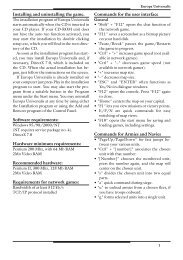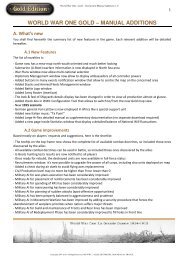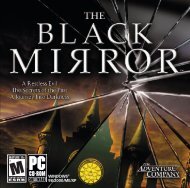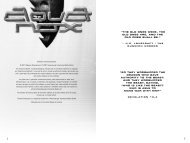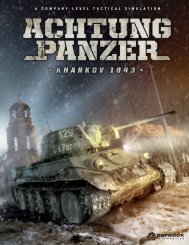Create successful ePaper yourself
Turn your PDF publications into a flip-book with our unique Google optimized e-Paper software.
Encounter Test<br />
An encounter test is made to determine whether a naval battle occurs. The<br />
test is made by calculating the sides’ difference in contact values, plus<br />
weather and control modifiers, and comparing it with the level of the sea<br />
hazard. If the test gives an equal or greater value, a battle occurs.<br />
Modifiers:<br />
+? Contact values difference (as per missions)<br />
- 2 Rain or snow weather<br />
+1 enemy sea<br />
If a contact is established, the first engaged fleet is the “scout fleet”. Failing<br />
that, any 1- or 2-EP fleet. For the moment, no other fleet may take part in<br />
the battle.<br />
14.2.4 Most Common Sea Sorties and “Hints”<br />
These are the most common situations players will see happen:<br />
● If both sides choose a “Control” mission, their fleets find each other<br />
and a naval battle occurs automatically.<br />
● If the German chooses only a Raid or a Patrol, the fleets usually must<br />
check for encounter to see whether or not they find each other.<br />
● There is a surprise risk at sea. The player with surprise receives many<br />
bonuses (but surprise is uncommon).<br />
● To be safe, you should use 2 fleets together: First the scout fleet (with<br />
the famous fast battlecruisers), and then the grand fleet (with all the<br />
slower battleships).<br />
- If a naval battle occurs, the scout fleet fights first (at a low surprise<br />
risk). Then the 2nd fleet will try to enter the battle later.<br />
- In the North Sea, the common sorties are, by side:<br />
German: Sortie of the scout fleet alone to launch a raid against Great<br />
Britain (or a patrol, to bluff); or sortie of two with the Hoch See fleet to crush<br />
70 World War One: La Grande Guerre 1914-1918<br />
the British scout fleet (hoping it is alone, without the Home Fleet), but this<br />
requires the Kaiser’s permission.<br />
British: Sortie of the scout fleet alone in patrol, with or without the Home<br />
Fleet or, from time to time, a Control mission (very expensive) in order to<br />
have the best chance to intercept and crush the German fleets.<br />
● A huge naval battle is often tactically to the German’s advantage, but<br />
the law of numbers, when the British Home fleet is coming, changes it<br />
into a British advantage and forces the German to make a quick<br />
retreat in order to escape.<br />
● In the Mediterranean, the Austrian fleet often stays in port, because<br />
the French fleet is superior (even worse if Italy is Entente), but mostly<br />
because of the sheer economic cost of activation. It may change if<br />
Italy has joined the Central Powers, as the Italian and Austrian fleets<br />
combined may prove a challenge for the French navy.<br />
14.3 Naval Tactics and Battle Types<br />
If a naval encounter occurs, the nature of the combat will depend on he<br />
tactics the players choose and on chance. The players’ choices have a<br />
direct influence on the possible battles.<br />
14.3.1 Combat Tactics<br />
If a naval encounter occurs, each player must choose a Combat Tactic from<br />
those offered at the start of the battle. They are simultaneously disclosed<br />
when the fight starts.<br />
There are 5 different tactics: T Cross the T, L Line of battle, C Column,<br />
A Circle Arc, F Free Formation. Each tactic has an advantage or<br />
disadvantage, depending on the enemy tactic with which it is crossed.<br />
There are:



